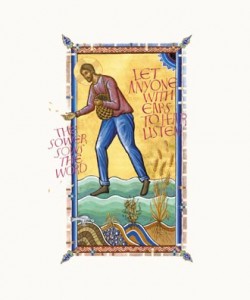Wisdom 12: 13, 16-19
Psalm 85
Romans 8: 26-27
Matthew 13: 24-43
Sometimes a consistent theme jumps out at the reader/hearer from the week’s lectionary readings for Mass. Other times it takes a bit of thought and delving into the readings to pick out a common thread. With a little bit of work and reflection there is a solid message for those of us engaged in the discussion and cultural debates of moral theology that define our contemporary period, marked as it frequently is by bitter divides and harsh language.
The first two readings from the book of Wisdom and the Psalms lay a foundation for teasing out a message from the Epistle and Gospel. Both of the readings from the Hebrew Bible for this week point to the theme of God’s justice and mercy as it is grounded in God’s power as creator and sustainer of the universe. In these readings it is clear that the power to judge resides in God alone, and that God chooses – because it is in God’s nature – to temper that power with mercy and patience: “But though you are master of might, you judge with clemency, and with much lenience you govern us.” And the Psalm repeats that the God of the universe is “slow to anger, abounding in steadfast love and kindness.” Finally, in the book of Wisdom the message for humankind is clear: “those who are just must be kind.” In other words, those of us called into a loving relationship with this powerful God of the universe are also called to emulate God’s kindness, patience, and justice.
In the Gospel reading from Matthew we are presented with a series of parables, followed at the end by an allegorical explanation of the parable of the wheat sown in the field. This provides an interesting contrast for us to follow in the flow of these readings from Matthew. Parables are directed toward a particular person or persons, while allegory opens up a universal meaning to be applied in new contexts. So for example, as Jesus is depicted as the “new Moses,” the one who explains and deepens the understanding of the law, he speaks his lessons to the Pharisees and scholars of the law in Chapter 12. In Chapter 13 he turns to the crowds – presumably, those “people of the land” who dwelt in the Galilean countryside – who follow him and continues by teaching them in parables in order to help them gain a deeper appreciation for the kingdom of God. The kingdom is like the field in which the wheat is sown, a mustard seed, and the yeast in the dough.
Taken as parables, Jesus is telling the crowds that the kingdom of God starts small and over time grows like a seed or like yeast, even as many other processes – some of them evil – simultaneously continue in their own natural course. In these parables, the crowds are being taught to be patient with this process, to wait for the final coming of God’s justice amidst God’s mercy and patience, even amidst evil and suffering. Following his typical pattern, Matthew then depicts Jesus providing an allegorical explanation of the parable, but this time only to his disciples. In this allegory, Jesus further explains that God’s justice will come, but it will come through God’s own agents – the Son of Man, the angels – but that the righteous who have waited patiently will then “shine like the sun.”
I think there are two ways that those of us engaged in moral theology today can apply these parables and allegory, one of which provides a useful lesson, the other of which calls for rejection. The latter option, the one that I suggest we reject, would indicate that our role as theologians and those engaged in the struggle for the Gospel amidst our particular cultures and societies is to work to perfect ourselves – and perhaps maybe our Church – and let the weeds do as they will, trusting that God will sort everything out in the end. On the surface this could be consistent with the message in the readings for this week. But ultimately this becomes an excuse for cowardice and laziness rather than a call to follow the Gospel. The former option, the one that I suggest we follow, underwrites a humble yet bold proclamation of the Gospel – bold because we work to counter against injustice when we see it, but humble because we know that ultimately the end result depends upon God.
In a culture where ethical discourses are marked by rampant distrust of those with whom we disagree, finger pointing and blaming, and a general lack of respectful dialogue, these readings call for patient but bold trust in God combined with consistent work to strive for a justice that mirrors God’s will for creation. Moreover, this calls not only for the virtues that I have already mentioned – patience, trust, mercy – but also courage and endurance, because each of us has not only the external weeds of evil to contend with, but also our own internal struggles with pride, anger, and impatience to endure. This suggests that even as we must speak the truth of the Gospel boldly, we must also listen carefully – to the Word of God, to our own inner voice, and to those with whom we disagree, those whom we tend to think of as the evil weeds that we must try to root out rather than endure in patience and love. Perhaps this is one of the great struggles of our time. While we continue to be involved in two wars, while peoples all over the world continue to rise up and demand recognition of their rights against injustice and dictatorial rulers, while debates rage over our national debt, while “all creation is groaning in labor pains,” we know and trust that our own pain and struggles to work for justice are perhaps a sign that the “Spirit himself intercedes with inexpressible groanings” to help us along the way. Because of this bold and patient trust in the power and justice of God, we are empowered to struggle for justice without demonizing those whom we disagree.


